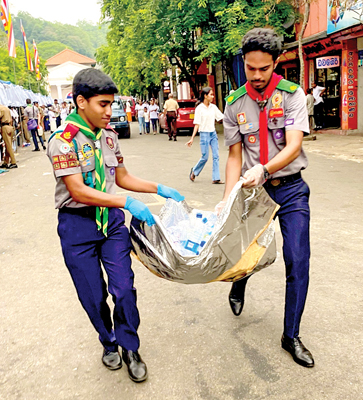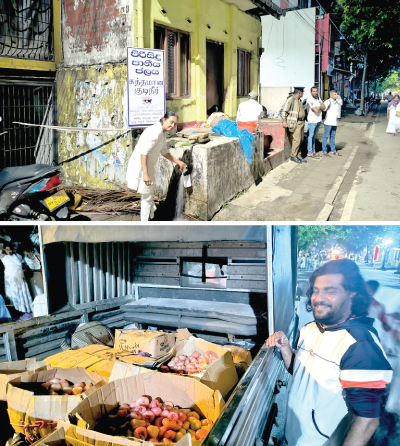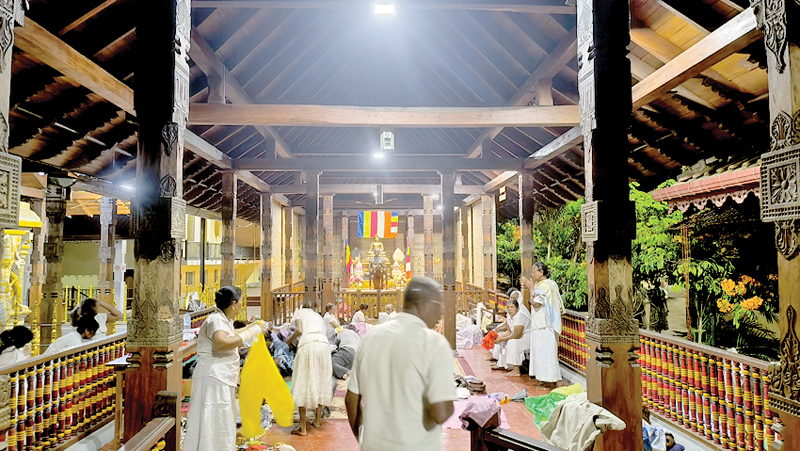 The Buddha’s Tooth Relic Exposition, also known as the Sri Dalada Vandanawa, which ends today (27) attracted hundreds of thousands of devotees to Kandy to catch a glimpse of the most venerated relic of Gautama Buddha.
The Buddha’s Tooth Relic Exposition, also known as the Sri Dalada Vandanawa, which ends today (27) attracted hundreds of thousands of devotees to Kandy to catch a glimpse of the most venerated relic of Gautama Buddha.
The ten-day Exposition, taking place after 16 years, is now considered to be one of the largest Expositions in the recorded history of the country. Staying true to the tradition of the Sovereign (in more modern times, the Executive President) being the first citizen to view the sacred Tooth Relic, this year’s Exposition was opened to the public after President Anura Kumara Dissanayake paid homage to the sacred relic.
Devotees queued en masse days prior to the official start date of the Exposition. Multiple queues snaked all the way to Katugastota and Ampitiya towns, seven kilometres away. Special trains, buses, and traffic plans made the Exposition more accessible to the public than ever before. With close to half a million devotees — four times the population of Kandy — attempting to enter the city for the event, it was only a matter of days before Kandy became overwhelmed.
 Despite a special website being launched by the Temple of the Tooth Relic, to assist devotees with real-time data on public transport timetables, car parks, queue starting points, locations of portable toilets, medical camps, and even AI-assisted monitoring systems, and with over 12,000 police and Armed Forces personnel deployed for crowd control, the entire Exposition was a Herculean task to manage.
Despite a special website being launched by the Temple of the Tooth Relic, to assist devotees with real-time data on public transport timetables, car parks, queue starting points, locations of portable toilets, medical camps, and even AI-assisted monitoring systems, and with over 12,000 police and Armed Forces personnel deployed for crowd control, the entire Exposition was a Herculean task to manage.
Even with hundreds hospitalised and six deaths reported due to adverse weather and health complications, on average, a devotee would spend three to four days in the queue. At such a time, the generosity and hospitality of the Kandyans have come as a surprise and a blessing for the Temple administration and local law enforcement agencies.
The art of giving
Whether a devotee joins the queue from Ampitiya or Katugastota, food, cool drinks, water, and ice cream were offered by well-wishers and locals. From farmers and traders bringing truckloads of watermelon and bananas, to local youth, and sometimes even bhikkhus handing out tea buns and packets of rice, it is fair to say that devotees never had a moment of hunger.
Many who spoke to the Sunday Observer said they almost never had to buy any food or beverages throughout their time in the queues. While many treasured the generosity of the locals, in response to food waste, which has created a discourse among the netizens, the devotees said that poor infrastructure surrounding the Exposition often left them without a proper place to eat or rest.
“We have to suddenly stop near drains and garbage dumps. How can we open a packet of rice and eat when there is raw sewage right next to you? They should have organised this properly,” said Nandawathie (64) from Balangoda.
Nandawathie, who joined the queue from Katugastota, spent four days in the queue before entering the Kandy city on Saturday (25). While expressing gratitude to the numerous banks, supermarkets, shops, and restaurants that opened their doors for devotees to use their restrooms during working hours and their doorsteps and car parks to sleep in at night, Nandawathie said this should have been the responsibility of the Exposition organisers.
Like Nandawathie, many who spoke to the Sunday Observer said that while sanitation facilities were provided, they were inadequate, resulting in devotees spending long hours queuing for the few portable toilets throughout the city.
 Harischandra (52) from Vavuniya, who had been staying in the queue for more than four days, said that due to the poor organisation, people squabbled for their place in the queue, with some taking extreme measures not to leave. “People would defecate into plastic bags, clean themselves with bottles of water and leave the bags on garbage dumps or by the roadside. The stench is just unbearable,” said Harischandra.
Harischandra (52) from Vavuniya, who had been staying in the queue for more than four days, said that due to the poor organisation, people squabbled for their place in the queue, with some taking extreme measures not to leave. “People would defecate into plastic bags, clean themselves with bottles of water and leave the bags on garbage dumps or by the roadside. The stench is just unbearable,” said Harischandra.
Clean-ups in Kandy
While the Municipal Council and social service organisations were constantly carrying out clean-ups in Kandy and around the queues, the smell of rotting food, sweat, faeces, and urine was nauseating. It is almost as if the odour had seeped into the very infrastructure of the city.
Wijepala (68) from Udawalawe, who had been in the queue for over five days, said that Corporate establishments and local mosques stepped in to look after the welfare of the devotees, alleging that local temples and the organisers failed to provide the basic necessities.
“I showered yesterday for the first time in five days, thanks to the Muslims and their mosques. This is the first time I’ve walked into a mosque in my life. We were getting soaked in thunderstorms and exposed to the scorching sun. They looked after us like their own children. They let us shower, fed us, and gave us coffee round the clock. In one mosque, they had around 15 people just to keep it neat and tidy for us,” says Wijepala. He also alleged that many local Buddhist temples outside the city locked their gates to prevent devotees from entering, an allegation made by many in the queues.
One of the largest issues present at the Exposition is the disorderly handling of crowds. While attempts had been made by the organisers to restore some order, issuing stickers and deploying additional troops, conflicts in queues were common. In one instance, the Sunday Observer witnessed an elderly woman joining a queue around 3.15 am, near a school turned into temporary accommodation for police officers. Soon after, 14 others claiming to be her relatives, and having queued previously, joined her, sparking protests. Police officers watched helplessly until a senior officer sternly advised all devotees to maintain peace and refrain from exploiting others.
“What can we do? Are we to arrest these old people? Are we to beat them up? This is why people are stuck in these queues for so many days. People need to have self-discipline and respect for others. They are here to seek blessings, but they carry more recriminations than blessings through their own selfish and rude behaviour,” the senior police officer said.
 While such conflicts are common, driven by selfishness or sheer frustration, it was also refreshing to see devotees looking out for one another. Chitra (65) from Kurunegala, who suffers from a chronic bone disease and uses crutches, opted out of the special queue and remained in the general queue for six days.
While such conflicts are common, driven by selfishness or sheer frustration, it was also refreshing to see devotees looking out for one another. Chitra (65) from Kurunegala, who suffers from a chronic bone disease and uses crutches, opted out of the special queue and remained in the general queue for six days.
“Police and Army officers asked me to join the special queue, but I am still strong. I can hold on. I didn’t want to take the place of someone worse than me,” said Chitra. She alleged that the slow movement of queues was due to unofficial VIP queues forming behind the Temple of the Tooth, an allegation made by many devotees and acknowledged by junior police officers.
The not-so-VIPs
One police officer, who wished to remain anonymous, told the Sunday Observer that it was almost like a mafia behind the scenes. “Senior officers chase juniors away if they get too close to seeing the ‘VIP queues’. Thousands are taken inside the temple through these queues. When there’s an event in Kandy, we juniors have to not only look after our seniors but also the temple officials,” he said.
The Sunday Observer reached out to the Deputy Inspector General (DIG) of Police for Kandy and Matale, Sudath Masinghe, for clarification regarding these allegations.
“Lies! Just outright lies! There is no such VIP queue! The Diyawadana Nilame, the Nilames of the four main Devales, the Mahanayake Theras, and the bhikkhus in charge of the Thewawa – each gets to bring 500 family members, friends, or acquaintances daily. Senior Police officers and Army officers get to bring 150 each day. Air Force and Army senior officers get 100 each day. This is not a VIP queue! This is just the normal way things are done,” DIG Masinghe added. Despite repeated attempts, the Sunday Observer was unable to obtain a response from Diyawadana Nilame Nilanga Dela Bandara or those in the Maha Viharas.




